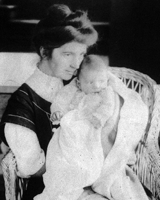
Margaret Sanger
is honored with a Premium Paver from Friends of Margaret Sanger: Constance Anderson, Mimi Balazs, Bud Beren (Misco Charitable Trust), Margot A. Breckbill, Peggy R. Browning, Denice Bruce, Barbara S. Coats, Marilyn DeBoer, Melody Eby, Susan Fischer-Lukens, Marilyn Harp, William L. and Marlene F. Hayes, Colleen Kelly Johnston, Douglas Johnston, James McClure, R.B. Parriott, Planned Parenthood of Kansas, Inc., and Kris Wilshusen.
 September 14, 1879 - September 6, 1966
September 14, 1879 - September 6, 1966
"When the history of our civilization is written, it will be a biological history, and Margaret Sanger will be its heroine." H. G. Wells, futurist and historian, made that prediction in 1931. Almost 70 years later Margaret Sanger remains the singular most important heroine in the history of women's struggle for freedom and the right to have control over their own reproductive destinies.
Margaret Sanger was born into an Irish working-class family where she witnessed her mother's slow death, worn out after 18 pregnancies and 11 live births. She chose to work as a practical nurse and midwife in the poorest neighborhoods of New York City in the years before World War I. She saw women deprived of their health, sexuality, and ability to care for children already born.
Contraceptive information was so suppressed by the laws at that time that it was a criminal offense to send such information through the mail. The educated had access to "French" products (condoms and other barrier methods) and "feminine hygiene" products (spermicides). But the poor had no way to secure such information or product. Many of her patients, after having another baby they could barely feed or clothe, begged her for help in preventing yet another pregnancy. It was against the law for her to share even the most basic of family planning knowledge.
It was this injustice that inspired Sanger to defy Church and State. In a series of articles called "What Every Girl Should Know," then in her own newspaper "The Woman Rebel" and finally through neighborhood clinics, Sanger put information and power into the hands of women. Sanger pushed legal and social boundaries by initiating sex counseling, founding the American Birth Control League (which became, in 1942, Planned Parenthood Federation of America) and organizing the first international population conference.
Sanger was past 80 when she saw the first marketing of a contraceptive pill, which she had helped develop. But legal change was slow. Jailed in 1915 for opening her first birth control clinic, it took until 1965, a year before her death, for the Supreme Court to strike down a Connecticut law that prohibited the use of contraception, even by married couples!
Margaret Sanger's brave and active life included three children, two husbands, a lifetime of hard work, and an international network of friends, supporters, and colleagues.
The basic beliefs for which she fought her entire adult life included:
1. A woman's right to control her body is the foundation of her civil rights.
2. Every person should be able to decide when or whether to have a child.
3. Every child should be a wanted child.
4. Women and men are equally entitled to sexual pleasure.
Margaret Sanger's fight for freedom, dignity, and the unqualified right to self determination for everyone won her the respect of countless millions.
We Wichitans who admire her ideals and her willingness to struggle to see those ideals become realities gratefully dedicate this tribute to our personal heroine. We believe that when the history of the 20th century is written, Margaret Sanger will loom large as one of the most important agents of freedom, progress, and social justice.
Women of today: your right to reproductive self determination was only recently won; that right can be quickly lost if you fail to continue the struggle.
September 12, 1998










